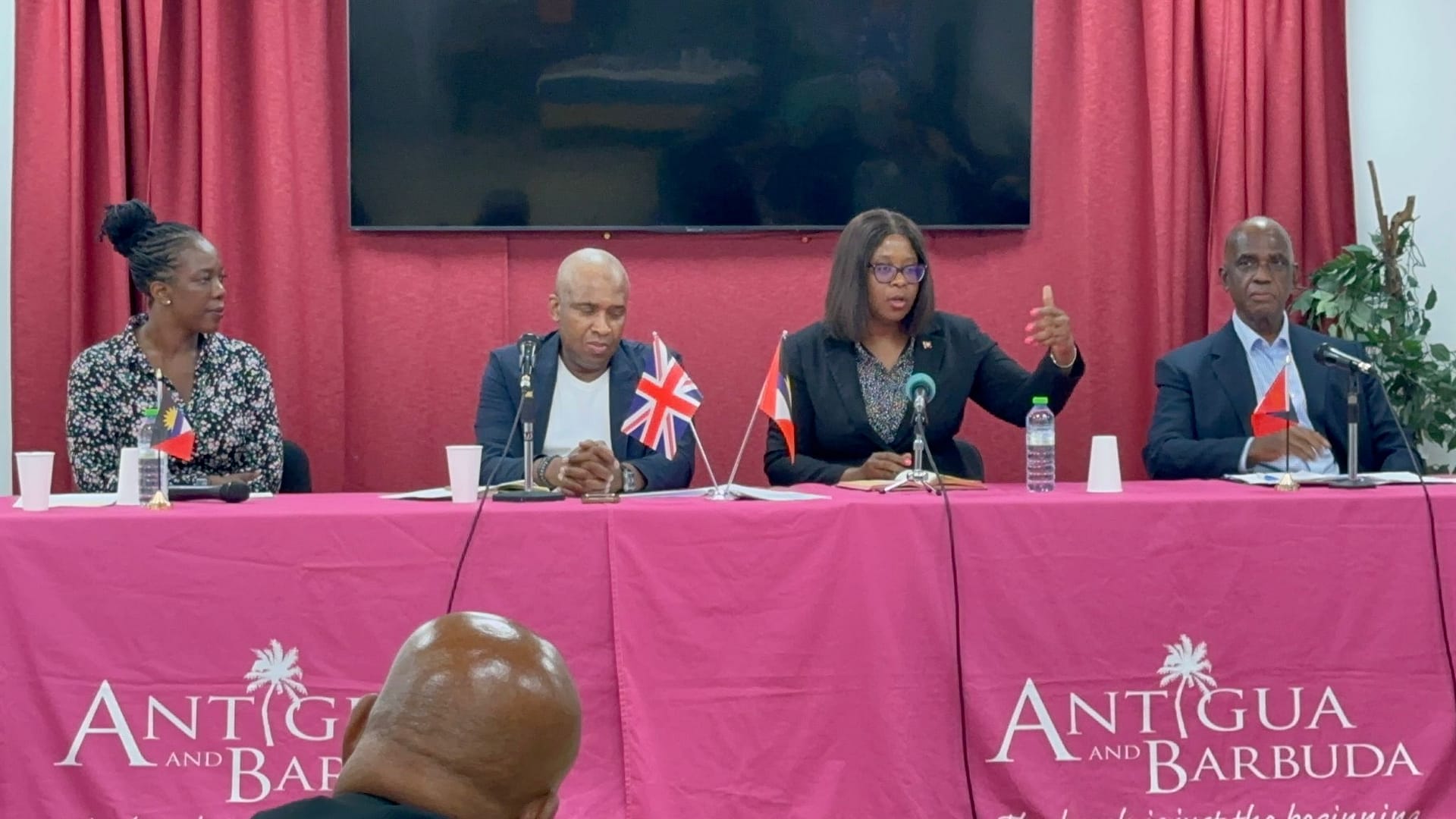
The Antigua and Barbuda High Commission (London) hosted a panel discussion on the topic
‘The Role of The Windrush Generation in Creating Economic and Social Growth in The Caribbean Region.’ The panel discussion formed part of the Voices of Windrush Festival (VOW Fest) which is a 6 week long calendar of events featuring discussions, panels, theatre, literature, spoken word and art. It was organised to celebrate the 75th anniversary of the arrival of the HMT Windrush, the ship which brought 492 passengers from the English Speaking Caribbean to the United Kingdom.
Members of high level panel included economist Dr Jonathan Thomas, statistician and actuary Dr Godfrey Martin and Her Excellency Karen-Mae Hill, Antigua and Barbuda’s High Commissioner to the United Kingdom. The panel was moderated by pupil-barrister Creanna Dodson.
The event was well attended by members of the Caribbean diaspora and academia in the United Kingdom and provided intellectual stimulation for the captive audience. During the discussion a range of questions were put to the panellists on possible economic development strategies that could be implemented in the Caribbean region. The answers explored the role of remittances, economic diversification into new sectors like the blue economy and how the region can revitalise existing sectors like agriculture and tourism. Regional integration was also seen as an important pillar in any regional economic development strategy as it will allow for more intra- Caribbean trade, reduce the dependence on foreign imports and generate the economies of scale needed for small island economies to survive in the global economy.
Her Excellency Karen-Mae Hill made several interventions throughout the discussion. She spoke about the need to create more awareness of the Windrush generation and their link to the Caribbean region. She emphasized that the region, despite its small size, external limitations and youthfulness in terms of political independence, has managed to punch above its weight in several notable areas including in sport, industry and education.
The founder and curator of the Voices of Windrush Festival, Partner and Head of Immigration at Leigh Day Solicitors, Jacqueline McKenzie, expressed her gratitude to High Commissioner Hill and the Antigua and Barbuda High Commission for hosting the event.
She said, “It is important to recognize the arrival of the Windrush ship which symbolically heralds the start of the mass movement of Caribbean nationals to the UK on the 22 June 1948. It was important to celebrate the 75th anniversary in a big way, which is why I put on a 6 week festival
to discuss the history, experiences and futures of the Windrush Generation. I’m indebted to HE Karen- Mae Hill, High Commissioner of Antigua and Barbuda, for her support for the Windrush Generation, including those affected by the Windrush Scandal, and for hosting such an important event in the Festival, a discussion on the role the Windrush Generation can play in creating economic and social growth in the Caribbean region.”
The Antigua and Barbuda High Commission has played an active part of the Voices of Windrush Festival and continues to support the advocacy and public engagement efforts of the Voices of Windrush Ltd. and other similar Windrush interest groups and causes.
Advertise with the mоѕt vіѕіtеd nеwѕ ѕіtе іn Antigua!
We offer fully customizable and flexible digital marketing packages.
Contact us at [email protected]














trying to make a legacy from something?
Enslavement is not a bygone event; the DNA of enslaved people is real today, as it was back then.
Descendants of the enslaved people are subjected still to the hegemonic system that drained Africa of its natural resources, trafficked Africans and forced them into free labour.
Post emancipation saw a different type of enslavement through globalisation whereby the hegemonic system crippled the Caribbean economy and the very raw material such as sugar they in turn are selling refined sugar to Caribbeans. Exploitation and cheap labour within tourists industry where black people are subjected to verbal abuse and low wages.
The legacy that Caribbeans have inherited is us being regarded as low hanging fruits.
Yes indeed, the FIRST generation of Windrush migrants came to Britain to help rebuild the country after WWII and then take on the menial jobs that the English deemed beneath them and didn’t want to do.
Then the SECOND generation who were born in Britain, and the Caribbean children that the FIRST generation brought over to join them, were mostly treated as INFERIOR intellectually in the education sector, because many of the British/English teachers and educators from the mid 60s and throughout the 70s, were instructed not to make the same efforts to teach black children as their white counterparts (and one of the major reasons why Caribbean parents started their own schools).
Grenadian 🇬🇩 author Bernard Coard highlighted these facts in his amazing discourse (and another of my favourite reads):
‘How The West Indian Child is made education sub-normal in the British School System’
Here’s a disturbing quotation from Bernard Coard’s book:
“Black children were failed by the [British] education system because they were not expected to achieve …”
WOW!
If you only EVER read ONE book that makes you sit-up and take notice – then this is the tome.
Hopefully, these erudite panelists will also make a note of these discriminatory practices that took place in the past, and still effects to this day the – now elderly – Caribbean Brits 🇬🇧.
Remember, knowledge is power 🤜🏽🤛🏽
*Educationally sub-normal*
Comments are closed.